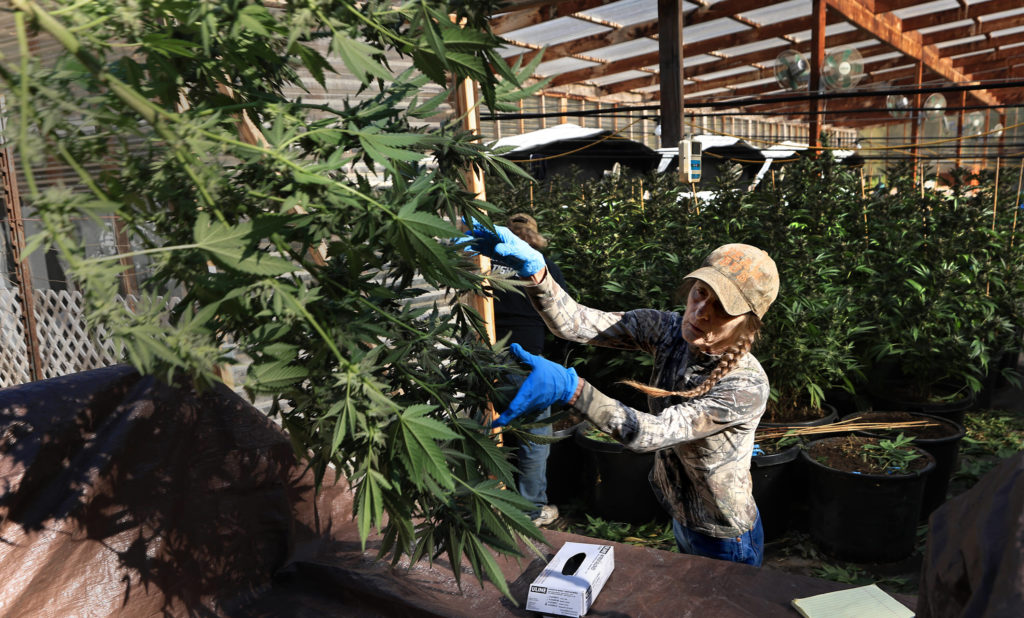HONEYDEW — In the decades before legalization, Gary and LaDonna Haga secretively grew marijuana in the coastal redwood forests of Northern California because why wouldn’t they when it sold for $4,000 a pound?
They knew their isolated corner of Humboldt County like the backs of their hardworking hands.
They hid plants from law enforcement helicopters and crafted elaborate platforms to grow marijuana beneath the forest canopy.
Then, California voters spoke in 2016, and recreational cannabis began to emerge from the shadows.
The Hagas, who had only moonlighted as outlaws, decided to grow full-time.
Wake up to local news every day. Subscribe and start your day in-the-know, exclusively from the Press Democrat newsroom.
They plowed their savings into a legitimate husband-and-wife business, growing 10,000 square feet of plants in two greenhouses labeled “his” and “hers.”
They poured their labor and sweat into their crop — literally: On one August afternoon, the greenhouses registered 135 degrees as Gary and LaDonna staked plants to keep them from falling over.
They could have continued to operate on the black market, as many farmers have. But the Hagas were confident there was money to be made growing marijuana in Humboldt County, now without the risk of prison.
“We thought we were the smart ones,” Gary Haga said. “We were (expletive) misled.”
But the state’s regulatory structure left the Hagas as vulnerable as working in the shadows did. Despite legalization, the black market continued to thrive. Legal cannabis accounted for only 40% of sales in the state in 2021, according to industry research firm BDSA.
Local governments meanwhile restricted legal sellers’ market access — two-thirds of California cities continue to prohibit them, according to a report in the Los Angeles Times.The commodity price sunk from thousands of dollars a pound to as low as $100, according to some farmers. And the state regulations and steep taxes that drove up their costs provided little protection against what would become one of the hardest blows of all: the retailers and distributors who took their crop and never paid.
One thing is clear. Both salt-of-the-earth farmers are among the growing ranks of once-optimistic entrepreneurs left embittered and financially battered by California’s nascent legal cannabis industry. Out of sight and out of mind of the voters who approved it, the wreckage is mounting in the same rural Northern California counties that illicitly fed the nation’s pot habit for decades.
“We’re definitely not going to make it,” Gary Haga said. “It’s a matter of how long we can hang on.”
‘Guy in a suit’
With legalization, helicopters and federal agents were replaced by both a flood of new faces and a dizzying array of bureaucratic challenges for farmers like the Hagas. There were environmental inspectors, consultants and attorneys.
Among the newcomers to the once reclusive corners of pot-growing Humboldt County was Chris Coulombe, an ambitious, ideologically minded military veteran from Santa Rosa with a multimillion-dollar investment behind his new cannabis distribution company, Pacific Expeditors.
Tall, well-dressed and with the square-shoulder look of a former Army officer, Coulombe refers to himself as “the first guy in a suit in cannabis.”
For instance, the North Bay Business Journal named him to its 2018 “Forty under 40” list.
In Pacific Expeditors, the Hagas and their neighbors saw corporate competence and a road to market. State regulations structured the legal cannabis industry in three tiers: cultivator, distributor and retailer (dispensaries). Compliance costs made it too expensive for small farmers to seek distribution licenses and move their own product.
Coulombe saw a chance to lead an industry and turn a profit. In the Army, he had specialized in logistics. Now, a new product needed to find its way from his home in Northern California to the rest of the state and ultimately, he believed, the world.
After receiving a tip about the collapse of a cannabis distribution company called Pacific Expeditors, Press Democrat reporter Andrew Graham conducted more than a dozen interviews with former clients, employees and others associated with the company. He also researched hundreds of pages of publicly available records while seeking additional documents from cannabis regulators.
In August, Graham and Press Democrat photographer Kent Porter traveled to the Mattole Valley to gain an understanding of the area and the farmers cultivating marijuana there.
Following that visit, Graham conducted several interviews with former Pacific Expeditors CEO Chris Coulombe to learn his side of the story.
Further reporting verified Coulombe’s depiction of a company unable to pay farmers whose product it moved because retail operations were not paying his Pacific Expeditors company, either.



